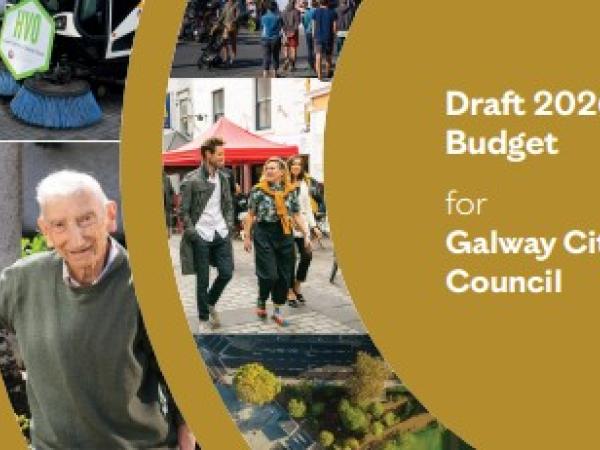
The Elected Members of Galway City Council this week (Monday 24 November 2025) adopted a budget of €159,251,136, with a focus on ‘back to basics’ delivery of essential services. Areas proposed for include housing delivery; street cleaning; homeless supports; maintenance of community facilities; footpaths; grant schemes; planting and maintenance crews and a new disability access officer. A number of potential income generators were proposed by Members to fund measures in the 2026 budget, including rates from new businesses, levies on derelict sites, a proposed dividend on the Port of Galway and potential growth in commercial services.
Funding Delivery
ARV: As part of the adoption of Budget 2026, Elected Members approved an adjustment in the Annual Rate on Valuation (ARV) to 0.2369. This adjustment will generate an additional €1.3m in revenue 2026. This adjustment is a welcome uplift, while still lagging behind the country average - substantially below ARV rates in the cities of Dublin, Limerick, Cork and Waterford. 93% of ratepayers in Galway City pay less than €30,000 in rates annually.
Parking: Members approved a marginal increase in parking charges to bring them closer to the charges applied by commercial operators in the city. The increased rates are €2.50 per hour, with long term car parks at Dyke Road and Cathedral Car Parks charging a daily rate of €10. Monthly parking will remain at €100 per month.
Potential New Funding Sources: Members directed the Executive to explore a number of new potential income sources to fund service delivery including:
-
Levies on derelict sites, which includes a mix of residential, commercial and institutional buildings. While no funds have been collected to date for levies issued in 2025, funds will be recoupable when derelict properties are sold in future.
-
Rates on new commercial properties – with rates becoming chargeable by Galway City Council after properties have undergone valuation by Táilte Éireann.
-
Port of Galway Dividend – subject to the provisions of the Companies Act 2014, a dividend from Galway Harbour Company could generate €100,000 in income.
-
Commercial Services – generate additional revenue of €150,000 from the commercial services operated by the Council
Mayor of the City of Galway, Cllr Mike Cubbard commented, “I’d like to acknowledge the Elected Members and Senior Management in Galway City Council for their collaboration on the 2026 budget and the exchange and dialogue that has been on-going over the past number of months. It was a difficult process, but the decision of Council positions us now to continue targeted delivery of services in 2026 for the people of Galway City”
Leonard Cleary, Chief Executive, Galway City Council said, “The adoption of the 2026 Budget Book positions Galway City Council to continue provision of essential core public services in the year ahead, as part of a wider programme of investment over the five year term of council. We continue to engage with national government to secure funding allocations that reflect Galway City’s scale, growth and cost pressures. As the only city in the western region and a major driver of economic growth, Galway contributes significantly to the national economy. Nearly 30% of all workers in the Western Region live within the Galway city catchment, an increase of 3% since the last Census. Appropriate national allocations, alongside locally raised funds, are essential to deliver for our 84,000 residents, 30,000 students, businesses that choose Galway, and over two million annual visitors. I as Chief Executive together with the Directors, CPG (Corporate Policy Group) and the Elected Members will review work areas to see where expenditure can be paused to avoid a deficit, until the new income sources proposed by the Elected Members become available. In terms of driving forward the strategic priorities for Galway City, we will adjust timelines based on the resources available and look forward to continuing to build national and local resources to invest in our city”.
Helen Kilroy, Director of Finance, Galway City Council commented, “The Budget Book represents extensive engagement with Directors, Heads of Function and the Elected Members and business/ community sectors with a focus on safeguarding the Council’s finances, while continuing investment in essential services, supporting competitiveness and ensuring Galway remains a vibrant city. The decision of Council in terms of marginal increases in both ARV and parking rates supports our efforts to tackle underinvestment in the city in previous years. The new potential sources of income proposed by the Elected Members will be explored, and any funds which become available in 2026 will allow us to target areas of concern, and to invest in our communities, services and capital infrastructure, to deliver for the people of Galway City”.
Key delivery areas for Budget 2026 include:
-
Housing and Urban Development: Delivering new housing, and maintaining existing housing stock; addressing dereliction; local area plans for Murrough and Castlegar; and enhancing supports for people experiencing homelessness
-
Public services and community infrastructure: increased street cleaning and maintenance to improve customer experience and support the drive for Galway City to build on the Gold Medal in the 2025 National Tidy Towns Awards with an overall win; maintaining community facilities; grant schemes; footpath repairs; market area refurbishment; delivering Green Spaces Strategy; and appointment of a Disability Access Officer.
-
Sports and recreation – Continue progression of Masterplans for sports and recreation; pitch and park maintenance; higher sports grants; and city-wide local improvement schemes.
-
Economic and Financial Initiatives: small expansion of Shopfront Enhancement scheme; investing in a new Retail Plan for Galway; and investment in festivals and events.
-
Workforce and organisation redevelopment: Increased digitisation of services and processes
Work Areas Cut in 2026 include the Joint City and County Economic Strategy, climate action retrofits in community buildings, restoration works in castles, Leisureland and a payment incentive scheme for rate payers.
